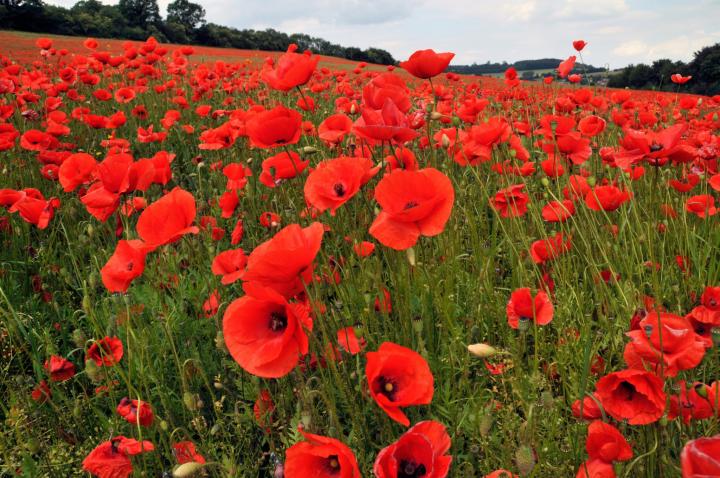MEMORIAL DAY DATE, TRADITIONS, HISTORY, AND MORE

What is the meaning of Memorial Day, and how is this different from Veterans Day? Find Memorial Day history—plus, facts about poppies, poetry, and picnic recipes!
WHEN IS MEMORIAL DAY?
This U.S. federal holiday is celebrated on the last Monday of May to honor the men and women who have died while serving in the military.
| Year | Memorial Day |
| 2018 | Monday, May 28 |
| 2019 | Monday, May 27 |
| 2020 | Monday, May 25 |
MEMORIAL DAY HISTORY
The custom of honoring ancestors by cleaning cemeteries and decorating graves is an ancient and worldwide tradition, but the specific origin of Memorial Day, or Decoration Day as it was first known, are unclear.
In early rural America, this duty was usually performed in late summer and was an occasion for family reunions and picnics. After the Civil War, America’s need for a secular, patriotic ceremony to honor its military dead became prominent, as monuments to fallen soldiers were erected and dedicated, and ceremonies centering on the decoration of soldiers’ graves were held in towns and cities throughout the nation.
After World War I, the day expanded to honor those who have died in all American wars.
No less than 25 places have been named in connection with the origin of Memorial Day, and states observed the holiday on different dates. In 1971, Memorial Day became a national holiday by an act of Congress; it is now celebrated on the last Monday in May.
Since it all started with the Civil War, you might want to brush up on your knowledge of this event by visiting the Library of Congress Civil War collection, which includes more than a thousand photographs.

THE POPPY, A SYMBOL OF MEMORIAL DAY
The wearing of poppies in honor of America’s war dead is traditionally done on Memorial Day (not Veterans Day). The origin of the red poppy as a modern-day symbol of this day was actually the idea of an American woman, Miss Moina Michael. Read more about the inspiration for the poppy.
In war-torn battlefields, the red field poppy (papaver rhoeas) was one of the first plants to grow. Its seeds scattered in the wind and sat dormant in the ground, only germinating when the ground is disturbed—as it was by the very brutal fighting during World War 1.
The practice of wearing of poppies was further inspired by the poem “In Flanders Fields,” written in 1915 by Canadian soldier John McCrae. He saw the poppies in burials around his artillery position in Belgium.
Today, poppies are both the symbol of loss of life as a symbol of recovery and new life, especially in support of those servicemen who were damaged physically or emotionally.
In Flanders Fields
by John McCrae, May 1915
In Flanders fields the poppies blow
Between the crosses, row on row,
That mark our place; and in the sky
The larks, still bravely singing, fly
Scarce heard amid the guns below.
We are the Dead. Short days ago
We lived, felt dawn, saw sunset glow,
Loved and were loved, and now we lie
In Flanders fields.
Take up our quarrel with the foe:
To you from failing hands we throw
The torch; be yours to hold it high.
If ye break faith with us who die
We shall not sleep, though poppies grow
In Flanders fields.
DIFFERENCE BETWEEN MEMORIAL DAY AND VETERANS DAY
Many people confuse Memorial Day and Veterans Day. Memorial Day is a day for remembering and honoring military personnel who died in the service of their country, particularly those who died in battle or as a result of wounds sustained in battle.
While those who died are also remembered, Veterans Day is the day set aside to thank and honor ALL who served—in wartime or peacetime—and whether they died or survived. Veterans Day is always observed officially on November 11, regardless of the day of the week on which it falls.
Click for our page on Veterans Day.
Remember: Raise the flag in honor! Here are the American Flag Guidelines.
MEMORIAL DAY RECIPES
Memorial Day is also the unofficial start of summer and picnic fun. Here are a few of our favorite picnic dishes that will feed a crowd.
- Make Picnic Scalloped Potatoes ahead and bring along to the picnic.
- If you want something with a kick, try easy-to-prepare Spicy Grilled Beef and Black-Bean Salsa.
- Everyone will love our favorite summer salad.
- Lemon Sugar Cookies are easy to transport and the perfect ending to a picnic.
COMMENTS